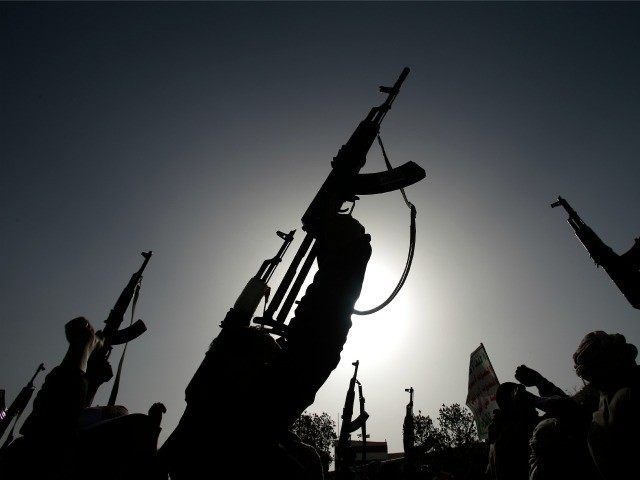WASHINGTON, D.C.—The Pentagon, amid the chaos plaguing Yemen, is unable to recover more than half a billion dollars worth of weapons, equipment, and other U.S. taxpayer-funded security assistance provided to the impoverished Arab country, according to a U.S. defense official.
It remains unclear to what extent the military supplies provided by the United States have ended up in the hands of America’s enemies and other bad actors.
When asked whether the Pentagon is planning to take any action to recover the military supplies it lost track of in Yemen, a defense official, speaking on condition of anonymity, indicated that the DoD’s hands are tied until the U.S. reopens its embassy in the Yemeni capital Sanaa.
“Due to the current situation on the ground, the [U.S. embassy’s] Office of Military Cooperation is unable to conduct inventories at this time,” the defense official told Breitbart News. “As soon as the Embassy resumes operations in Sanaa, the Office of Military Cooperation will work with those [Yemeni military] units to re-inventory the equipment.”
By then, U.S. enemies in Yemen, home to al-Qaeda in the Arabian Peninsula (AQAP) and Iran-backed Houthi rebels, may be in possession of many of the U.S.-funded weapons and equipment, since it remains uncertain when the embassy will open again.
The U.S. closed its Yemen-based embassy in February and evacuated its troops from the country. The following month, Shiite Houthis took over the presidential palace and other government buildings in Sanaa.
The defense official would not confirm whether the weapons and equipment supplied by the U.S. have ended up in the wrong hands.
However, Shiite Houthi rebels and AQAP may have already gained access to the military supplies.
In mid-March, unnamed U.S. officials confirmed to The Washington Post that “the Pentagon is unable to account for more than $500 million in U.S. military aid given to Yemen, amid fears that the weaponry, aircraft and equipment is at risk of being seized by Iranian-backed rebels or al-Qaeda.”
At the time, U.S. defense officials claimed that “there was no hard evidence that U.S. arms or equipment had been looted or confiscated.”
Some Yemeni military units with access to the military supplies donated by the U.S. maintained their allegiance to the country’s former President Ali Abdullah Saleh after he was forced out in 2012.
Close relatives of Saleh oversaw or commanded U.S.-trained Yemeni forces before the former leader was ousted.
An investigative report, released by the United Nations (U.N.) in February, accused the former president’s son Ahmed Ali Saleh of ransacking an arsenal of Yemeni military weapons after he was removed from his position as commander of a U.S.-trained elite unit.
The U.N. report claimed that among the stolen goods were supplies and equipment similar to those that the United States sent to Yemen.
The former leader’s son has denied the looting allegations.
Iran-backed Houthi rebels, targeted by a Saudi Arabia-led air campaign since March 26, have allied themselves with military units loyal to Saleh, raising the possibility that they have gained access to the weapons and equipment supplied by the U.S.
The Houthis and their allies are fighting armed groups on the ground who support Yemen’s internationally recognized President Abed Rabbo Mansour Hadi.
Al-Qaeda in the Arabian Peninsula (AQAP), considered by the United States government to be the jihadist network’s most dangerous branch, is said to be benefiting from the chaos in Yemen, expanding its operations and seizing military assets that may have been provided by the U.S.
AQAP and the Houthis are considered to be bitter enemies.
The defense official who spoke to Breitbart News suggested that a substantial portion of the estimated $500 million in security aid provided to Yemen was spent on training the country’s troops.
“The $500M is total security assistance package over eight years, a large component of which is training Yemeni forces, which is a costly undertaking,” he said.
F0llow Edwin Mora on Twitter: @EdwinMora83.

COMMENTS
Please let us know if you're having issues with commenting.